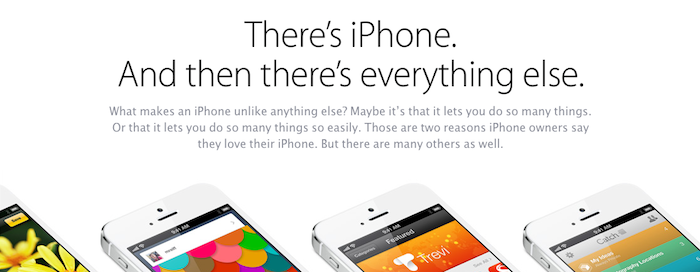In the past week Apple’s marketing chief, Phil Schiller, gave three interviews and the company sent out a new “Why iPhone” email campaign - both timed perfectly around the announcement of Samsung’s new flagship smartphone, the Galaxy S4. Some have called it out as Apple going on the defensive, others have said it’s Apple on the offensive. I’m not sure that you can categorically say it’s one or the other – it doesn’t really matter much.
I think the real story here is that Apple has now implicitly, but rather openly, acknowledged the threat that Samsung represents and made clear they won’t just ignore it. In the past, Apple’s marketing of the iPhone was able to ignore competitors and focus on the features that make it great.[1] They certainly made occasional jibes and criticised their competitors but they would be isolated and often in very general terms. But this last week’s campaign is unmistakably different because it wasn’t just a cleverly timed press release or keynote invitation email, it was three interviews with an Apple executive, a new webpage, and email campaigns that were timed to undermine and hijack Samsung’s Galaxy S4 event and their media coverage.
You might argue that this kind of strategy isn’t new to Apple, and you’d be right. Apple ran a similar strategy with their Mac vs. PC ad campaign. But the important distinction here is that Apple wasn’t the market leader with the Mac, they were the small competitor with 5% market share against the behemoth that was Windows and the PC industry. So it made sense that Apple would target common fears, concerns, and criticisms of Windows and PCs in order to sell their product.
But until now, it made no sense for Apple, with a large lead on other smartphones, to engage with competitors and go on a defensive (or offensive) marketing campaign around their product launches. Why would you want to highlight your competitors and risk the media perceiving your actions as trying to subvert a competitor’s launch? The risk would simply outweigh any potential reward. The difference now is that Samsung is not only perceived to be a significant threat to Apple, but they are also taking a substantial chunk of sales and profits from the smartphone market that would otherwise be Apple’s[2].
Let’s ponder for a moment to think what might have happened if Apple didn’t conduct those interviews or send out that email campaign. My thinking is that Samsung would have completely dominated the smartphone discussion over the week and perhaps for a considerable time into the future. Sure, a lot of the press wasn’t glowing towards the S4, but that would still be helpful to the perception of Samsung as the real competitor to Apple - if not cementing in a lot of people’s minds that Samsung is the new Apple.
Besides, if Apple had stayed silent, I can imagine many fostering the belief that Apple wasn’t taking competitors seriously or perhaps that they didn’t even know how to respond. So whilst Schiller may have made a silly, unforced error in his interviews and even seemed a little bit like an old-record[3], I think that it’s better than staying silent.
The recent strategy may also be related to the fact that Apple’s first half of 2013 could have no new iOS device launches if they stick with September and October launches for the iPhone and iPad. If that does indeed hold true (I have some doubts), then Apple will struggle to keep control of the narrative of the smartphone and tablet markets (and the perception of their own future), unless they occasionally engage in new marketing strategies such as this one.
In any case, don’t expect this recent Apple marketing as a one-off. Particularly when it comes to Samsung (perhaps Apple’s biggest short to medium term threat?), Apple really has to pursue a more active marketing agenda. I doubt Apple will go down the road Samsung has, but they won’t let Samsung take the lead on smartphone or tablet discussions.
Further reading:
- ‘Ceding the crown’ - good discussion and rebuttal of the notion that Apple has ceded the crown to Samsung in the smartphone market
- ‘Apple is Losing The War – Of Words’ - Gassée argues that Apple’s previous strategy of relying on the numbers to tell their story isn’t working anymore.
- Though the iPhone 5 TV advert, “Thumb”, was particularly clever in that it highlighted the iPhone 5’s larger display, whilst also delivering a disguised jibe at large Android phone displays. ↩
- Apple took 69% of smartphone profits in 2012, Samsung 34% (adding up to 103%, because the other handset makers lost money) ↩
- Anyone else think that the fragmentation argument has run its course and isn’t really that effective anymore? ↩


